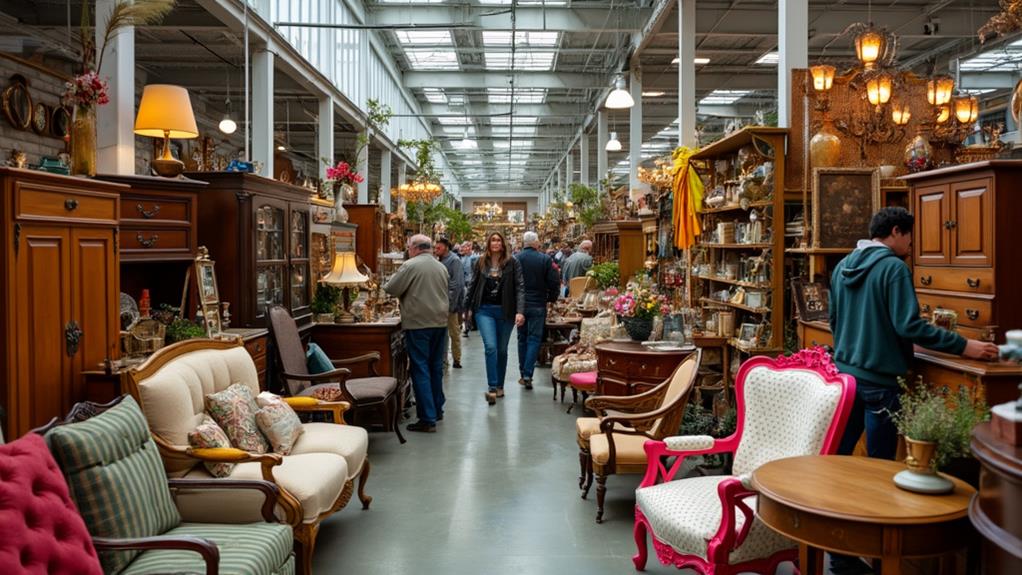The furniture resale market is outpacing new sales, marked by a projected 40.8% growth in the UK from 2022 to 2027. This surge is fueled by changing consumer attitudes that prioritize financial prudence and environmental sustainability. A significant portion of this demand comes from younger demographics, who value ecological benefits and affordability associated with second-hand purchases. Companies like Rehome and Vinterior are capitalizing on these trends by leveraging digital platforms and partnering with established brands. Combined with economic factors such as rising housing costs, the resale market offers a practical solution for budget-conscious consumers. Explore further to uncover additional insights.
Table of Contents
ToggleResale Revolution Gains Momentum

The furniture resale market in the UK is experiencing a remarkable surge, projected to expand by 40.8% from 2022 to 2027, reaching an estimated value of £1101 million.
This growth rate considerably outpaces the overall furniture market's expansion of 7.9%, indicating a transformative shift in consumer behavior.
The rise in the resale market is largely attributed to an increasing consumer focus on financial prudence and environmental sustainability.
As consumers become more cost-conscious and ecologically aware, purchasing pre-owned furniture emerges as an appealing option.
The trend signifies a change towards mainstream acceptance of resale options, driven by the dual benefits of affordability and reduced environmental impact.
Consequently, resale furniture is becoming an integral part of the UK's furniture acquisition landscape.
Embracing Second-Hand Furniture
As the momentum of the resale revolution continues, consumer attitudes towards second-hand furniture are evolving rapidly. Over 25% of consumers are now showing interest in resale furniture options, reflecting an increased acceptance of pre-owned items.
This shift is largely driven by the accessibility and perceived viability of second-hand furniture as an alternative to new purchases. Consumers are increasingly recognizing the value in sustainable practices, aligning their purchasing habits with broader environmental and financial considerations.
The expansion of the second-hand market is further facilitated by a cultural shift that embraces sustainability, with used furniture being integrated into mainstream acquisition strategies.
Consequently, this trend signifies a meaningful transformation in consumer behavior, viewing second-hand furniture as both environmentally responsible and economically advantageous.
New Players in the Market

Emerging companies are reshaping the furniture resale market with innovative business models and fresh perspectives. Notable entrants like Rehome and Vinterior are leading this transformation, leveraging digital platforms to streamline the buying and selling process of second-hand furniture.
These companies have forged strategic partnerships with established brands, such as IKEA, enhancing their product offerings and market reach. This surge of new players has intensified competition, resulting in a wider array of choices for consumers and diversifying the market landscape.
By integrating technology and sustainability into their operations, these companies are not only attracting environmentally conscious consumers but also redefining consumer expectations.
As these entities continue to grow, they are pivotal in driving the expansion of the furniture resale sector.
Youth-Led Demand
Driving the growth of the furniture resale market is the significant demand from younger consumers, particularly those aged 24-34. This demographic is increasingly prioritizing eco-consciousness and financial prudence, making resale furniture an attractive option.
Their purchasing habits reveal a strong alignment with values of sustainability and budget-friendliness, contributing to a robust shift towards pre-owned furniture.
Key factors influencing this trend include:
- Eco-Consciousness: Millennials and Gen Z are more inclined to purchase items that reduce environmental impact.
- Financial Savvy: This group is often managing student debt and maneuvering through economic uncertainties, prompting cost-effective choices.
- Digital Influence: The prevalence of online platforms facilitates easy access to a wide range of second-hand furniture.
These drivers highlight the critical role of youth in shaping the future of the furniture resale market.
Housing Challenges and Resale Growth

While the enthusiasm of younger consumers propels the furniture resale market, broader economic factors also play a pivotal role.
The ongoing housing market challenges, characterized by heightened mortgage rates hovering around 6% and a 73% rise in UK house prices over the last decade, have intensified the attractiveness of resale furniture.
For many, especially first-time homebuyers, the resale market offers a financially viable alternative to furnish homes amidst budget constraints.
The dual pressures of economic prudence and environmental consciousness further amplify this trend, as consumers seek cost-effective solutions that align with sustainable values.
Consequently, the furniture resale market is not only benefiting from youth-driven demand but is also increasingly seen as a strategic response to prevailing housing affordability issues.


